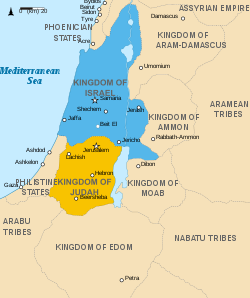People of the Promised Land: Solomon

Nothing evokes wisdom like the name of Solomon.
But Solomon was more than the guy who told two prostitutes arguing over one baby to cut the baby in half to discern the true mother. Solomon built the kingdom of Israel to its greatest geographical extension and material prosperity. He also brought the kingdom to its knees with his policies of oppression and luxury. So who was Solomon? Why do we in the 21st century care?
Who was Solomon?
Son of David and the third king of Israel, Solomon lived from approximately 970-930 BC. Having every advantage as the son of a king, God offers Solomon whatever his heart desires–and he chooses wisdom. A lot of the Proverbs are written by him. Proclaimed king by his father, David, Solomon reaped the hard work of David, as Israel flourished in its Golden Age. The Promised Land had been attained, and the nation was at peace. Solomon built God’s temple, the finest building in the world at that time. He beefed up the military and engaged in trade with other nations, bringing in untold riches to Israel.

Yet, Solomon did not have the heart for God that his father, David, did (1 Kings 11:6). He strayed and as he fell, so too did Israel. He marries a foreign wife. He makes burnt offerings to his wives’ gods. He indulges in excesses. To pay for all of it, he instituted Israel’s first taxation system. He sold off northern towns to other kings. God was not the center of Solomon’s life. Civil war erupted and Israel and Judah were once again separate nations, which is the subject of BSF’s People of the Promised Land Part II.
What Can We Learn from Solomon’s Life?
Even someone with the best advantages and a heart from God can fall if he or she strays. Solomon had every advantage and finished a disappointment. God equipped him to accomplish the tasks laid before him, which Solomon did when he believed in him. Solomon allowed ungodly people (namely his wives) to influence him. He turned from God, and the downward spiral sped up.
Here’s a great post on 10 Life Lessons we can learn from Solomon HERE